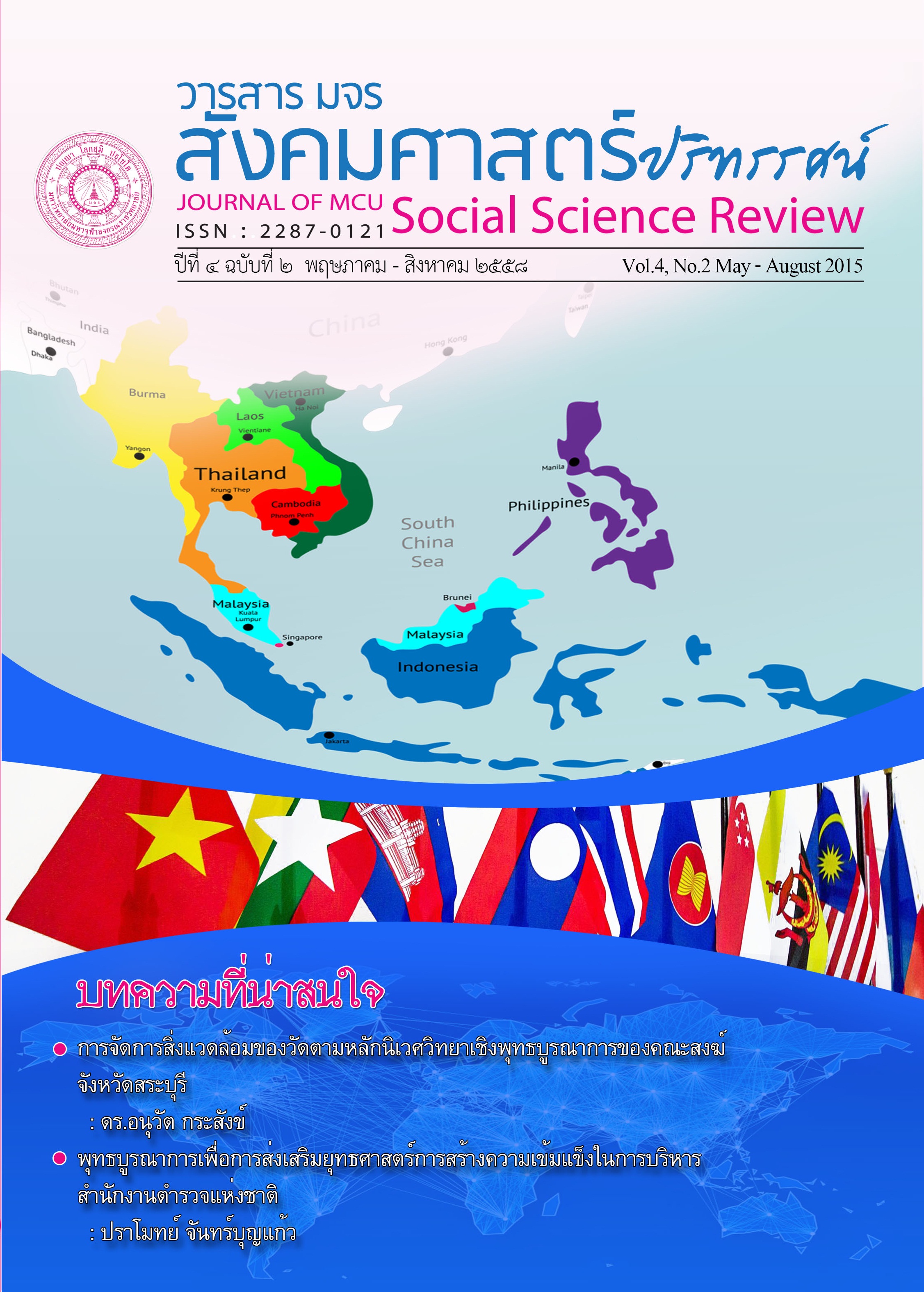การบูรณาการหลักพุทธธรรมเพื่อเสริมสร้างกระบวนการมีส่วนร่วมในการกำหนดนโยบายสาธารณะขององค์กรปกครองส่วนท้องถิ่น
คำสำคัญ:
การบูรณาการ, นโยบายสาธารณะ, องค์กรปกครองส่วนท้องถิ่นบทคัดย่อ
วิทยานิพนธ์นี้เป็นการศึกษาการบูรณาการหลักพุทธธรรมเพื่อเสริมสร้างกระบวนการมีส่วนร่วมในการกำหนดนโยบายสาธารณะขององค์กรปกครองส่วนท้องถิ่น มีวัตถุประสงค์ ๑. เพื่อศึกษากระบวนการกำหนดนโยบายสาธารณะโดยการมีส่วนร่วมของประชาชนในการกำหนดนโยบายสาธารณะขององค์กรปกครองส่วนท้องถิ่น ๒. เพื่อศึกษาวิเคราะห์สภาพการมีส่วนร่วมของประชาชนในการกำหนดนโยบายสาธารณะขององค์กรปกครองส่วนท้องถิ่น และ ๓.เพื่อเสนอแนวทางการบูรณาการหลักพุทธธรรมเพื่อเสริมสร้างกระบวนการมีส่วนร่วมในการกำหนดนโยบายสาธารณะขององค์กรปกครองส่วนท้องถิ่น
ผู้วิจัยได้ใช้ระเบียบวิธีการวิจัยแบบผสานวิธี ได้แก่ การวิจัยวิจัยเชิงคุณภาพด้วยการสัมภาษณ์เจาะลึกรวมทั้งหมด ๒๖ รูป/คน ใช้เทคนิคการวิเคราะห์เนื้อหา (Content Analysis) และการวิจัยเชิงปริมาณ โดยทำการวิจัยเชิงสำรวจโดยการแจกแบบสอบถามแก่กลุ่มตัวอย่างที่ศึกษา ได้แก่ ประชาชน ข้าราชการผู้บริหารที่มีสิทธิ์เลือกตั้ง ที่อยู่ในเขตองค์กรปกครองส่วนท้องถิ่นจังหวัดลำพูน จำนวน ๓๙๙ ตัวอย่าง วิเคราะห์ และประมวลผลโดยนำข้อมูลไปวิเคราะห์ข้อมูลด้วยเครื่องคอมพิวเตอร์ โดยใช้สถิติต่างๆ ดังนี้ ค่าความถี่ ค่าร้อยละ ค่าเฉลี่ย และค่าส่วนเบี่ยงเบนมาตรฐาน
ผลการวิจัย พบว่า
๑. กระบวนมีส่วนร่วมของประชาชนในการกำหนดนโยบายสาธารณะขององค์กรปกครองส่วนท้องถิ่น พบว่า ประกอบด้วย ๘ ขั้นตอน ได้แก่ขั้นตอนที่ ๑ การวางแผนกำหนดการสอบถามความต้องการ ซึ่งเป็นขั้นในการที่อยู่ในระดับของแผนงานขององค์กรปกครองส่วนท้องถิ่นขั้นตอนที่ ๒ ระบบการประสานงานกับสถาบันทางพระพุทธศาสนา ชมรมผู้ใหญ่กำนัน ในจังหวัดลำพูน และการประสานงานกับชมรมในท้องถิ่น ขั้นตอนที่ ๓ การสร้างกลไกการส่งเสริมการมีส่วนร่วมต่อกระบวนการกำหนดนโยบายต่อการใช้กิจกรรมวิถีหน้าหมู่ของชาวจังหวัดลำพูน ขั้นตอนที่ ๔ การให้ความรู้แก่ประชาชนต่อกระบวนการกำหนดนโยบายสาธารณะ ที่เป็นการให้ความรู้ตั้งแต่การก่อตัวของปัญหานโยบาย การกำหนดนโยบาย การตัดสินใจนโยบายหรือวิเคราะห์หาทางเลือก การนำนโยบายไปปฏิบัติ และการประเมินผลนโยบาย ขั้นตอนที่ ๕ การระดมความคิดด้วยการทำประชาคมในระดับหมู่บ้านที่เป็นเกิด การวางแผนในการปฏิบัติงานขององค์กรปกครองส่วนท้องถิ่น ขั้นตอนที่ ๖ การนำข้อความคิดเห็นของประชาชนมาระบุไว้ในแผนงานที่จะดำเนินงานตามกรอบนโยบายสาธารณะที่มีการจัดลำดับความสำคัญตั้งแต่สำคัญมาก ขั้นตอนที่ ๗ การนำแผนงานผ่านการลงประชามติอีกครั้ง เพราะการกำหนดนโยบายสาธารณะส่วนที่ยังขาดไป และขั้นตอนที่ ๘ การร่วมกันดำเนินงาน ติดตามตรวจสอบและประเมินผลจาการนำนโยบายไปปฏิบัติให้เกิดประสิทธิภาพต่อการบริหารจัดการนโยบาย
๒. สภาพการมีส่วนร่วมของประชาชนในการกำหนดนโยบายสาธารณะขององค์กรปกครองส่วนท้องถิ่นพบว่า สภาพการมีส่วนร่วมของประชาชนในการกำหนดนโยบายสาธารณะขององค์กรปกครองส่วนท้องถิ่นมีปัญหาอยู่ ๖ กลุ่มใหญ่ๆ ได้แก่ ปัญหาการมีส่วนร่วมของประชาชน ปัญหาเชิงการสื่อสาร ปัญหาเชิงโครงสร้าง ปัญหาเชิงกระบวนการมีส่วนร่วม ปัญหาทางการเมืองท้องถิ่น และปัญหาเชิงการบริหารจัดการ
๓. แนวทางการบูรณาการหลักพุทธธรรมเพื่อเสริมสร้างกระบวนการมีส่วนร่วมในการกำหนดนโยบายสาธารณะขององค์กรปกครองส่วนท้องถิ่น พบว่า ความเข้าใจและการประชาสัมพันธ์ถึงกิจกรรมการจัดการประชุม การประชาพิจารณ์ การทำประชาคมหมู่บ้าน และการสื่อสารในรูปแบบอื่นๆ (การประชุมบ่อยๆ) จะสามารถทำให้ประชาชนทราบถึงกิจกรรมต่างๆ พร้อมกันให้ความร่วมมือในระดับที่น่าพอใจ (ความพร้อมเพรียง) เพื่อให้เกิดความเข้าใจระดับการลงพื้นที่จนสามารถทราบปัญหาและความต้องการของประชาชน (ความเข้าใจชุมชน) และความมีใจเป็นกลาง (อุเบกขา) ที่ทำให้เห็นถึงแนวคิดของความเสียสละความสุขส่วนตนเพื่อประโยชน์ของส่วนรวมมากขึ้นต่อการสร้างระบบความสัมพันธ์ระหว่างองค์กรทางพระพุทธศาสนา รวมทั้งองค์กรในชุมชนกับองค์กรปกครองส่วนท้องถิ่นในการวางแนวทางสำหรับวางรากฐานให้กับประชาชนได้มีความรู้และมีส่วนร่วมต่อกระบวนการกำหนดนโยบายตั้งแต่เริ่มต้นอันประกอบด้วย การร่วมคิดนโยบาย การร่วมใจต่อนโยบาย การร่วมทำตามนโยบาย การร่วมแรงตามนโยบาย การร่วมทุนตามนโยบาย การร่วมรับผลประโยชน์อย่างเหมาะสม การร่วมดูแลรักษานโยบาย และการร่วมเป็นเจ้าของนโยบาย อันเป็นแนวทางสำหรับการเสริมสร้างการมีส่วนร่วมขององค์กรปกครองส่วนท้องถิ่นที่ยังคงเป็นมนต์คลังของชาวจังหวัดลำพูนที่เรียกว่า “วิถีครูบาโมเดล”
เอกสารอ้างอิง
(๑) หนังสือ:
พระพรหมคุณาภรณ์ (ป.อ. ปยุตฺโต). โพชฌงค์ : พุทธวิธีเสริมสุขภาพ. ธรรมบรรยายชุดที่ ๑ รายการเล่าเรื่องให้โยมฟัง. เมื่อวันที่ ๓ พฤศจิกายน ๒๕๒๘.
มหาจุฬาลงกรณราชวิทยาลัย. พระไตรปิฎกภาษาไทย ฉบับมหาจุฬาลงกรณราชวิทยาลัย.กรุงเทพมหานคร : โรงพิมพ์มหาจุฬาลงกรณราชวิทยาลัย, ๒๕๓๙.
รสคนธ์ รัตนเสริมพงศ์. การบริหารงานภาครัฐ. พิมพ์ครั้งที่ ๔. นนทบุรี : มหาวิทยาลัยสุโขทัย ธรรมาธิราช , ๒๕๕๑.
สำนักงานเลขาธิการวุฒิสภา. รัฐธรรมนูญแห่งราชอาณาจักรไทย พุทธศักราช ๒๕๕๐. พิมพ์ครั้งที่ ๓. กรุงเทพมหานคร : บริษัท ธนาเพลส จำกัด, ๒๕๕๐.
(๒) วิทยานิพนธ์/รายงานวิจัย:
นาคม ธีรสุวรรณจักร. “รูปแบบการบริหารงานตามหลักการบริหารกิจการบ้านเมืองและสังคมที่ดีขององค์การบริหารส่วนตำบลจังหวัดราชบุรี”. วิทยานิพนธ์ปรัชญาดุษฎีบัณฑิต. บัณฑิตวิทยาลัย : มหาวิทยาลัยรามคำแหง, ๒๕๕๔.
แม่ชีวงเพชร คงจันทร์. “การศึกษาวิเคราะห์ความสัมพันธ์ระหว่างหลักพุทธธรรมกับหลักกฎหมาย : กรณีศึกษาพระราชบัญญัติคุ้มครองผู้ถูกกระทำด้วยความรุนแรงในครอบครัว”. วิทยานิพนธ์พุทธศาสตรดุษฎีบัณฑิต. บัณฑิตวิทยาลัย : มหาวิทยาลัยมหาจุฬาลงกรณราชวิทยาลัย, ๒๕๕๖.
วีรพร เชื้ออ่ำ. “การพัฒนารูแบบการมีส่วนร่วมขององค์กรปกครองส่วนท้องถิ่นในการจัดการศึกษาขั้นพื้นฐาน ในภาคตะวันออกเฉียงเหนือ”. วิทยานิพนธ์ปรัชญาดุษฎีบัณฑิต. บัณฑิตวิทยาลัย : มหาวิทยาลัยรามคำแหง, ๒๕๕๓.
สุขุมาลย์ ประสมศักดิ์. “กลยุทธ์การมีส่วนร่วมของประชาชนในการจัดการสิ่งแวดล้อมตามหลักพุทธ ธรรมขององค์การบริหารส่วนจังหวัดในกลุ่มจังหวัดภาคกลางตอนบน”. วิทยานพินธ์พุทธศาสตร์ดุษฎีบัณฑิต. บัณฑิตวิทยาลัย : มหาวิทยาลัยมหาจุฬาลงกรณราชวิทยาลัย, ๒๕๕๖.
สุรศักดิ์ บุญเทียน. “การพัฒนารูปแบบการสร้างนโยบายสาธารณะเพื่อสุขภาพแบบมีส่วนร่วมของสมัชชาสุขภาพเฉพาะพื้นที่”. วิทยานิพนธ์ศิลปศาสตรดุษฎีบัณฑิต บัณฑิตวิทยาลัย : มหาวิทยาลัยนเรศวร, ๒๕๕๑.
๒. ภาษาอังกฤษ
(I) Book
Simon, Herbert A. Administrative Behavior. New York : Mc Millan, 1960.
Strauss, G. and Sayles. Personnel : The Human Problems of Management. Louise : University of Queensland Press, 1960.
Van Dersal. William R. The Successful Supervisor in Government and Business. New York : Harper, 1968.
ดาวน์โหลด
เผยแพร่แล้ว
รูปแบบการอ้างอิง
ฉบับ
ประเภทบทความ
สัญญาอนุญาต
ลิขสิทธิ์ (c) 2018 วารสาร มจร สังคมศาสตร์ปริทรรศน์

อนุญาตภายใต้เงื่อนไข Creative Commons Attribution-NonCommercial-NoDerivatives 4.0 International License.
เพื่อให้เป็นไปตามกฎหมายลิขสิทธิ์ ผู้นิพนธ์ทุกท่านต้องลงลายมือชื่อในแบบฟอร์มใบมอบลิขสิทธิ์บทความให้แก่วารสารฯ พร้อมกับบทความต้นฉบับที่ได้แก้ไขครั้งสุดท้าย นอกจากนี้ ผู้นิพนธ์ทุกท่านต้องยืนยันว่าบทความต้นฉบับที่ส่งมาตีพิมพ์นั้น ได้ส่งมาตีพิมพ์เฉพาะในวารสาร มจร สังคมศาสตร์ปริทรรศน์ เพียงแห่งเดียวเท่านั้น หากมีการใช้ภาพหรือตารางหรือเนื้อหาอื่นๆ ของผู้นิพนธ์อื่นที่ปรากฏในสิ่งตีพิมพ์อื่นมาแล้ว ผู้นิพนธ์ต้องขออนุญาตเจ้าของลิขสิทธิ์ก่อน พร้อมทั้งแสดงหนังสือที่ได้รับการยินยอมต่อบรรณาธิการ ก่อนที่บทความจะได้รับการตีพิมพ์ หากไม่เป็นไปตามข้อกำหนดเบื้องต้น ทางวารสารจะถอดบทความของท่านออกโดยไม่มีข้อยกเว้นใดๆ ทั้งสิ้น





